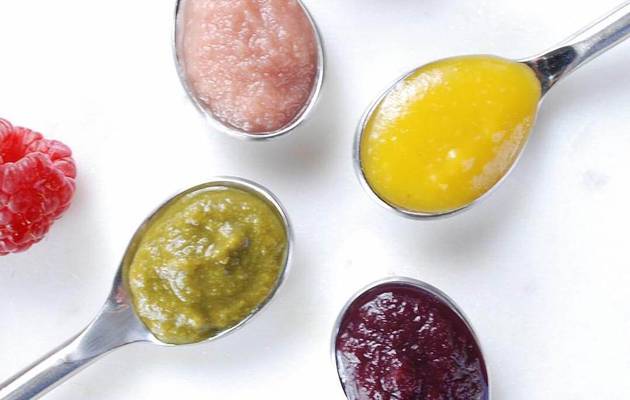Our friends at Beech-Nut®, a baby food company based in upstate New York, believe that healthy eating habits begin at a very young age. By focusing on feeding your little one real, natural fruits and veggies and avoiding artificial ingredients and added sugar, you can start on the right foot.
Beech-Nut® commissioned research on the dietary patterns of children ages 0-2 and found some startling truths:
- By 15 months, babies eat 6½ teaspoons of added sugars per day, mainly from fruit drinks, soda, cookies, sweetened yogurt and ready-eat-cereals, which are introduced into the diet as early as 9 months. What it means: To put that into perspective, an 8-ounce cup of cola has about 6 ½ teaspoons of sugar. So, babies are eating as much sugar in a day as what you’ll find in an entire cup of soda!
- By 1 year of age, the number-one source of fruit is fruit juice. What it means: Kids are drinking too much sugar, even if it is natural sugar from fruit juice. Drinking juice instead of eating whole fruit adds more sugar and less fiber to children’s diets.
- 1 out of 3 children 12-23 months old do not consume any fruit. What it means: These toddlers are missing out on key nutrients – such as fiber – because they aren’t eating any fruit!
- Less than half of babies are consuming any vegetables by the time they are 23 months old. And, for the babies who do eat vegetables, the most common veggie is potatoes from French fries and potato chips. What it means: When processed options like fries and chips are the most common form of vegetable, babies are missing out on nutrient-dense choices found in green veggies. In fact, only 1 percent of babies consume green vegetables!
- By 1 year of age, babies are eating more than 1500 mg of sodium per day from foods like hot dogs, cured meats, crackers, cheese and mixed pasta dishes. What it means: 1500 mg is the recommended daily limit of sodium for a fully mature adult.
What Can We Do About These Results?
When nutrient-dense foods like fruits, vegetables, lean proteins, legumes, whole grains and wholesome baby foods like Beech-Nut® blends are fed to baby during the first year, better eating habits are formed. And, just the opposite holds true – when non-nutritious, empty calories like processed, packaged foods and sweetened drinks are introduced, palates are set to crave what is sweet and salty, which ultimately has consequences for future health.
A Few Feeding Tips for Parents:
- Keep baby food in your little one’s diet for longer: Research shows that babies have more balanced diets between 6-8 months when they are given baby food.
- Encourage exploration: Baby food, whether homemade or store bought, doesn’t have to be synonymous with bland, flavorless blends. Think of feeding your babies real food that adults would eat (prepared in safe consistencies for babies, of course!) that are filled with flavor, texture, color and some fun.
- Keep it simple and colorful: Pick blends without added water or artificial ingredients or preservatives. Look for baby food with vibrant colors, which can signal freshness.
- Transition to real foods: When transitioning baby from pureed foods to whole foods, think real – which means foods from the ground or farm. While packaged goods have their place in the diet, and can save time and mess, they can often be high in sodium and added sugar with little to no nutrition value.
Recommended Natural Foods for Baby by Age:
- 1-6 Months Old: Talk to your pediatrician about supplementing breastmilk or formula with an infant oatmeal, rice cereal, or single-ingredient pureed fruits and veggies, like Beech-Nut Naturals® Just Apples, Just Carrots, or Just Green Beans.
- 6-8 Months Old: Once your baby is familiar with single-food solids, it’s time to move on to pureed combos such as pumpkin mixed with banana, strawberry with beets, and veggie blends to explore new flavors and thicker textures.
- 8-10 Months Old: Try mashing up their favorite fruits and vegetables with a fork to help them learn how to chew and swallow chunkier pieces (potatoes, squash, peas, and bananas are all great options for this). Experiment with soft finger foods, such as cut-up hard-boiled eggs, beans, and small pieces of whole-grain breads.
- 10-12 Months Old: Introduce superfoods like quinoa, flax seeds, and low-mercury fish such as salmon.
- 1-2 Years Old: As they continue to grow, so will their appetite! Toddlers typically need up to three snacks a day. Instill healthy snacking habits in your child with Beech-Nut® Fruity Oat Bars.
Always check with your pediatrician before introducing new foods to your baby’s diet.
Read more about heathy starts:
When You Need To Start Baby Proofing

